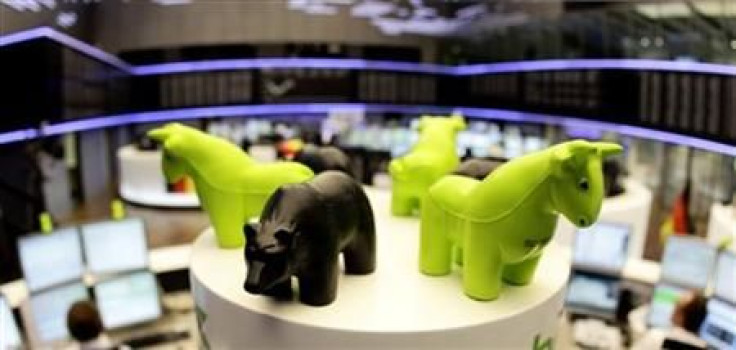Stocks negative on the year, gold hits record

Major stock indexes around the world lost all of their gains on the year and gold hit a record on Tuesday after a deal to raise the U.S. debt ceiling gave no comfort to investors preoccupied with sluggish global growth.
On Wall Street, the broad S&P 500 index .SPX fell for a seventh day, its worst streak since October 2008, giving up the year's gains, on worry that the debt ceiling agreement will not stave off a downgrade of the United States' prized triple-A credit rating.
Making matters worse, data pointing to a sluggish recovery continues to pile up around the globe. The sovereign debt crisis in Europe has not been corralled and is starting to engulf the large euro-zone economies of Italy and Spain.
Investors, focused on slowing global growth and the euro zone's spreading credit problems, opted for the relative safety of the Swiss franc, U.S. government bonds and gold, which hit its ninth record this year.
"The debt ceiling distraction may now be behind the markets, but the damage has been done," said John Kilduff, partner at hedge fund Again Capital LLC in New York.
"We are witnessing a quickly deteriorating economic backdrop that will pressure all asset classes."
President Barack Obama signed into law a measure approving a rise in the U.S. statutory borrowing limit and cuts in government spending.
Reduced government spending could further decelerate growth in an economy that is already stalling. Factory data earlier this week and Tuesday's consumer spending data showed the third quarter could be as weak as the first half of the year for the U.S. economy.
"The cuts are happening at probably one of the worst times," said Jonathan Xiong, who helps oversee $30 billion in assets as global investment strategist at Mellon Capital Management in San Francisco.
"Fundamentally, it's going to slow down economic growth. It also brings in future uncertainty ... (which) is causing everybody to postpone their consumption and spending."
The preference for safe-haven assets helped lift gold. Spot gold was at $1,656.19 an ounce, having touched an all-time high of $1,658.59 earlier in the day.
U.S. Treasuries rallied after rating agency Fitch said the debt agreement was "commensurate with 'AAA' rating." Treasuries were up for a fourth straight day, with the benchmark 10-year note up 35/32 to yield 2.625 percent.
Despite the upbeat comments, rating agency Fitch does not rule out slapping a negative outlook on the U.S. debt rating later this month, and fears that the United States could still lose its triple-A rating persist.
For a graphic on the S&P 500 see r.reuters.com/dug92s
"I think people are worried about a double-dip recession and the softening economic statistics," said Jeffrey Saut, Raymond James Financial chief investment strategist, in St. Petersburg, Florida.
The Dow Jones industrial average .DJI dropped 265.87 points, or 2.19 percent, to 11,866.62. The S&P 500 .SPX slid 32.89 points, or 2.56 percent, to 1,254.05. The Nasdaq Composite .IXIC tumbled 75.37 points, or 2.75 percent, to 2,669.24.
MSCI's world equity index .MIWD00000PUS fell 2.1 percent to its weakest since late June, sliding 1 percent lower for the year. The S&P 500 also turned negative for 2011.
U.S. dollar-denominated Nikkei futures .NKc1 dropped 1.6 percent --their largest daily fall in two months.
The Swiss franc rose to a record high against the euro and the U.S. dollar on concerns about euro zone sovereign debt problems and the chance of a U.S. credit downgrade.
Italian bond yields hit their highest level in the euro's 11-year lifetime, a sign that Rome is overtaking Madrid as the main focus of investors' concern about debt sustainability.
The Italian 10-year BTP yield was up 6.159 percent and the 10-year Spanish government bond yield rose to 6.344 percent after hitting 6.47 percent, its highest since 1997.
The two countries have been under increased pressure in recent weeks as markets feel the size of the euro zone's bailout fund is too small to protect larger economies if contagion from the Greek crisis cannot be stopped.
© Copyright Thomson Reuters 2024. All rights reserved.











